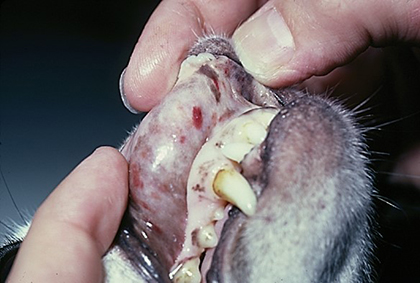Immune Mediated Thrombocytopenia

Immune Mediated Thrombocytopenia
I recently wrote about the concept of immune disease – those disorders where the immune system goes haywire and attacks normal cells in the body. In a more recent blog, I wrote about one of the important canine immune diseases, immune mediated hemolytic anemia (IMHA). Today’s blog post focuses on a disease similar to IMHA, immune mediated thrombocytopenia (ITP or IMTP).
Defining Immune Mediated Thrombocytopenia
The cell targeted by the out of control immune system in ITP is the platelet or blood clotting cell. The platelet is a powerhouse of coagulation. Under the microscope, a platelet is the smallest of the blood cells, yet the sticky platelet provides the first level of defense against hemorrhage. Platelets are in a large part responsible for the formation of a scab when you cut your skin while chopping vegetables or scrape your knee in a bike accident. Dogs, and the rare cat, with ITP can’t form a blood clot if nicked by the groomer because the immune system has destroyed their platelets. The lack of platelets can also result in spontaneous hemorrhage.
Recognizing Immune Mediated Thrombocytopenia
You, as the healthcare advocate for your pet, may be the first one to recognize clinical signs of ITP. The hallmark of a low platelet count is little pinpoint hemorrhages on the skin, in the mouth or on the whites of the eyes. Hemorrhage may occur internally making the stool dark like tar or the urine bloody. One of my patients with ITP recently relapsed and came to the ER with a bloody nose. But, not every pet with a low platelet count or bleeding has ITP.
Causes of Immune Mediated Thrombocytopenia
There are many other causes of low platelets that must be investigated before a diagnosis of ITP is made. Infectious disease tops the list of potential diagnoses for low platelets. Diseases transmitted by ticks top the list. Ehrlichiosis, Rocky Mountain spotted fever and Anaplasmosis may resemble ITP, but some readily available laboratory testing can quickly identify these diseases. Cancer, especially lymphoma or hemangiosarcoma can cause low platelet counts. Occasionally a reaction to a drug like an antibiotic can cause ITP. When a veterinarian cannot find an underlying cause of a low platelet count and a diagnostic evaluation is unremarkable, by the process of elimination, the diagnosis is ITP.
Treatment of Immune Mediated Thrombocytopenia
Even though the blood cell affected in ITP is different than in IMHA, the treatment is similar since the overactive immune system needs to be suppressed to prevent more platelets from being destroyed. The first line therapy involves the use of drugs like prednisone to suppress the immune system. A chemotherapy drug, vincristine, when administered to dogs with ITP increases platelet release from the bone marrow and helps normalize their platelet count faster and shortens hospital stay. Dogs are often hospitalized for several days in case hemorrhage is severe enough to warrant blood transfusion. Most dogs recover from ITP, but some require additional drugs to suppress the immune system long term.
Other diseases affecting the immune system include polyarthritis and a variety of immune mediated skin diseases which will be the topic of a future blog post.

































